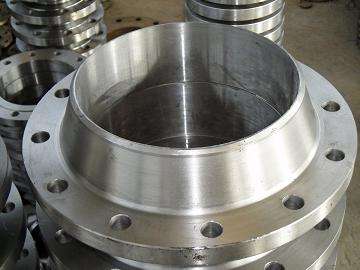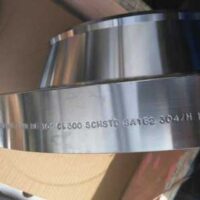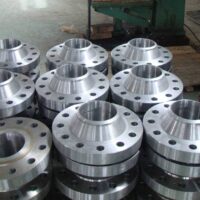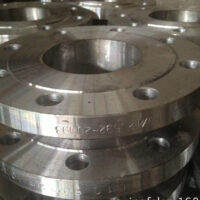Product Description
Nickel Flanges & Nickel Alloy Flanges
Inconel 625, Inconel 825, Inconel 600, Monel 400, Alloy 20, Nickel 200, Nickel 201, Incoloy 825, Hastelloy C276, Hastelloy C22, Incoloy 800 – Alloy Flanges
Cangzhou wilson pipeline sales@wilsonpipeline.com Is A Global Leading Supplier For Your Nickel Alloy Flanges Requirements.
Nickel has always been an important metal in many industries for a simple reason, because nickel is a multifunctional material that can form alloys with most other metals.
Both nickel and nickel alloys are non-ferrous metals with high strength and toughness, excellent corrosion resistance and outstanding high temperature performance. Pure nickel is a bright silver metal element in the iron family, and it is hard, malleable, and malleable. It is also tough, corrosion-resistant, and most importantly, it provides an excellent foundation for the development of special alloys.
Nickel easily forms alloys with many metals, including chromium, iron, molybdenum, and copper. This allows the use of various alloys, which have outstanding advantages and unique properties.
Its versatility makes it widely used in a variety of applications, such as aircraft gas turbines, steam turbines in power plants, and in the energy and nuclear power markets.
Properties of different nickel alloys
There is no doubt that the adaptability and natural properties of nickel make it a very useful metal. In addition, there are various nickel alloys, and you will get extremely sought-after materials.
When you change the chemical composition of the alloy in question, the benefits also change, giving nickel alloys a range of commercial uses.
So, what are the characteristics of nickel and nickel alloys? This is an impressive benefit:
High strength
Excellent toughness
Strong temperature intensity
Excellent corrosion resistance in sea water
Hydrofluoric acid resistance
The level of nickel alloys also has strong weldability, which means that when welding is used, even at extreme temperatures, nickel alloys must have superior toughness and fracture resistance.
Among all nickel alloys, special pipe materials are particularly good at two. Inconel alloy 825 made of approximately 38-46% nickel and Inconel alloy 625 made of 58% nickel.
Many different products can be purchased for special pipe materials, such as round bars, flanges and even seamless pipes in Inconel Alloy 825 or Inconel Alloy 625.
Application field
Nickel alloys are often the backing of industries that require highly durable materials without weakening or disappearing. Replacement parts can be very expensive, so it is in everyone’s best interest to ensure that each part is supplied for a specific purpose and manufactured to the end.
Nickel and nickel alloys can be used in a variety of applications. Some of these include:
Aircraft gas turbine
Steam turbine power plant
Medical application
Nuclear power system
Chemical and petrochemical industry
Aviation parts
Oil and gas plant
Defense and power generation industry
Desalination plant
Many of these situations require the materials used to have corrosion and heat resistance properties, so why nickel and nickel alloy products are ideal.
A specific example is the liquid natural gas industry. It has been determined that nickel steel alloys are the most effective in keeping natural gas at a very low critical liquefaction temperature.
Types of Nickel Alloy Flanges
Nickel Alloy Weld Neck flange
Their uniqueness lies in their protruding neck. The long welded neck flange has the same thickness as the pipe, making it ideal for severe working conditions (such as high pressure).
Nickel Alloy Threaded flange
They are only used for special applications. It is worth noting that you can quickly assemble threaded flanges without welding. As the name suggests, they are compatible with pipelines with external threads. Unlike welded neck flanges, threaded flanges are not the right choice where high pressure, high temperature and bending stress are involved.
Nickel Alloy Slip on flange
If your budget is tight, consider using a slide-in flange. They are the most affordable, but still get the job done. It must be a bit larger than the pipe to make it easier to slide through the pipe. These flanges are welded to one location by fillet welding and cannot withstand high pressure.
Nickel Alloy Lap joint flange
They are a slip-in flange, but are used with short end joints. They are ideal for systems that require regular inspection and maintenance.
Nickel Alloy Socket welding flange
They are very durable and very suitable for small diameter and high pressure pipelines. They have internal welds to enhance their durability and fatigue strength. They are mainly used in the chemical processing industry.
Nickel Alloy Ring joint flange
These flanges can withstand high pressure and high temperature. They have a groove that can be easily compressed on the binding, sliding or welding neck flange. They help avoid pipeline leaks under high pressure.
Nickel Alloy Orifice flange
These flanges can lead to metered liquid or gas lines. They are installed with orifice plates or flow nozzles.
Nickel Alloy Blind flange
The blind flange has no holes and is used to seal piping systems or containers. The blind flange must withstand high stresses due to internal pressure. They can be used in systems that require regular inspections.
Sizes: 1/2″ – 36″ +
Bores: S/5s – XXH
Nickel Alloy Flange Ratings
Pressures: 150# – 300# – 600# – 900# – 1500# – 2500#
Nickel Alloy Flanges Dimensions
Weight Of Nickel Alloy Flanges
Nickel Alloy Flanges Grades
Trade Name
UNS #
Flanges
Alloy® 20
N08020
B/SB462
A/SA182
F20
Nickel 200
N02200
B/SB564
Nickel 201
N02201
——–
Monel® 400
N04400
B/SB564
Inconel® 600
N06600
B/SB564
Inconel® 625
N06625
B/SB564
Incoloy® 800
N08800
B/SB564
Incoloy® 800H
N08810
B/SB564
Incoloy® 800HT
N08811
B/SB564
Incoloy® 825
N08825
B/SB564




